![]() The information provided by our expert should not constitute a diagnosis of your condition. Always consult a medical practitioner or healthcare provider for a formal diagnosis. By making use of this content, you agree that ConceiveEasy and the expert assume no liability.
The information provided by our expert should not constitute a diagnosis of your condition. Always consult a medical practitioner or healthcare provider for a formal diagnosis. By making use of this content, you agree that ConceiveEasy and the expert assume no liability.
If you are trying to conceive, and it’s just not working out, you are probably thinking about what you are doing wrong, and where things are getting messed up. It can be so frustrating and nerve wracking to try to figure out what is going on with your fertility, especially when you are trying your hardest to try to get pregnant. Claim Your 20 Free Pregnancy Tests – Click Here
However, today, we are going to share the top 10 reasons that you are probably not getting pregnant.
Hopefully this list can give you some insight into things that might go a long way towards improving your fertility and increasing your chances of getting pregnant.
Sometimes finding out what NOT to do is as important as finding out what TO do.

This is the number one, by and far, simplest, easiest and most common reason that women are trying and failing to get pregnant. Most women don’t really understand how getting pregnant works, and they just think all there is to it is having sex and getting pregnant.
However, what most women do not understand is that getting pregnant and conceiving is all about ovulation time.
Ovulation, which is when the egg is released and travels down to wait for the sperm, is something that only happens once per month. Every month until a woman reaches menopause, this will occur. However, ovulation only occurs at a certain time every month, usually somewhere around day 14 of a woman’s cycle.
Once ovulation occurs, the egg will travel down to wait to see if it will be fertilized by the sperm. If this happens, the embryo will implant in the uterine wall and a baby will develop! Yay!
If the egg is not fertilized, the egg will die, the uterine lining will shed, and in about 2 weeks from the day of ovulation, a woman’s period will start. Boo!
However, what most people don’t know is that the egg only lives for about 24 hours after it is released.
This is why it is so important for the egg to be fertilized during this time frame.
The good news is that sperm can live for up to 72 hours in the body, so if a woman can pinpoint her day of ovulation, couples can have sex a few days before ovulation and then the sperm can be already in the body and waiting for the egg to be released.
This is a great way for couples to easily boost their chances of getting pregnant. However, to use this “trick,” couples must know when ovulation is expected to occur.
There are tons of different ways that women can track their ovulation. One of the easiest ways is by using over the counter ovulation predictor kit tests. These tests work much like home pregnancy tests, and can pinpoint the LH surge in a woman’s body, which usually means that ovulation will occur within 24 hours (you can get 20 free ovulation tests with the ConceiveEasy offer above).
Other ways of tracking ovulation include charting basal body temperature, checking cervical mucus and cervical position, and using fertility tracking apps.

Another really common reason that women are sometimes unable to get pregnant is because, simply put, their bodies are not healthy enough to conceive. One of the best things that women can do to improve their fertility is to eat a healthy and well balanced diet. This is a great way to give fertility a boost and make sure that you are getting the proper vitamins, minerals and nutrients that are vital to growing a baby.
When it comes to diet, women should work on cutting the bad stuff out of their daily intake.
This goes for fast food and restaurant foods, which are often laden with empty calories, fat and high sodium. Sugary sweets such as donuts, candy, cakes and cookies should also be removed from a woman’s diet while she is trying to conceive, and junk food like chips and crackers should also take a backseat. It might not be too much fun, but women should really examine what kinds of things they are putting in their bodies when they are trying to conceive.
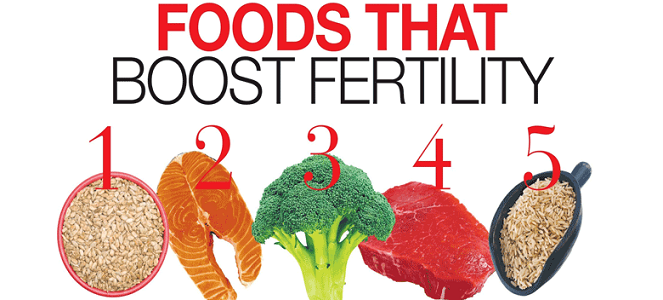
So, what SHOULD women eat when they are trying to conceive?
Good choices include tons of fresh fruits and veggies, organic whenever possible. Studies also show that full fat dairy products are better for women who are trying to conceive as opposed to their low fat alternatives. So that’s a treat!
Lean meats and proteins such as chicken, fish, beans, and peanut butter are great choices, and when it comes to grains, women should choose 100% whole grains like whole wheat pasta, whole wheat bread and brown rice. Including these items in a woman’s diet will really help to improve her chances of getting pregnant.

Yes, it might sound harsh, but the truth of the matter is, being overweight is one of the things that has the biggest impacts on fertility. When a woman is overweight, her hormone levels are often out of whack. This can mean that she is not ovulating properly, and sometimes not ovulating at all. However, there is good news where this is concerned.
Doctors and experts agree that losing weight is one of the most beneficial things that a woman can do if she is overweight and wants to conceive.
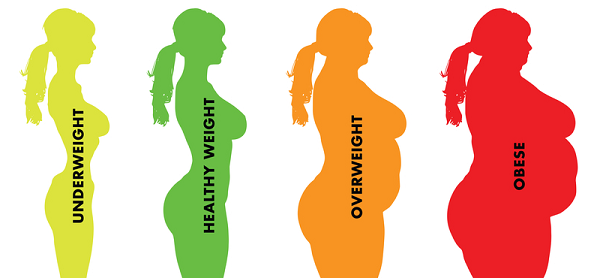
Even better? The fact that doctors say women who are overweight can benefit from losing as little as five to ten pounds. This can often be enough to resume ovulation and help women get their bodies and their cycles back on track.
If you are overweight and you are trying to conceive, please consider starting on a diet and exercise plan to cut just a little bit off of your weight. This can really be the thing that makes all the difference when it comes to trying to conceive.

Yes, we realize that many of these reasons might sound a little bit mean, but hey, it’s the truth! Women are sometimes so focused on getting pregnant that they can actually be sort of blind to the world around them, and the things that they might be doing that are actually detrimental to their fertility.
For example, women who smoke cigarettes, use illegal drugs, or drink alcohol can actually be damaging their own fertility without even realizing it.

If you are trying to get pregnant, it is important that you cut all of these things out of your life for the best possible chances of having a baby. The same thing even goes for drinking caffeine like sodas or coffee.
Some doctors say that a little bit is ok, but the best option is always to abstain from anything that could be considered damaging to fertility when you are trying to conceive.

Yes, ladies, that’s right. Just because you might be suffering from a fertility problem, doesn’t mean that it is YOUR fertility problem. In fact, doctors say that up to 30 percent of all fertility problems can be attributed to a male fertility issue. This is why it is so important to be concerned about sperm health as you are trying to conceive. There are a ton of different things that can contribute to the health of a man’s sperm, so definitely be informed.
Things that can affect sperm health:
• Alcohol
• Smoking cigarattes
• Man’s diet
• Weight problems
• Keeping testicles cool
• Chemical exposure

For example, sperm health can be greatly affected by a man’s use of alcohol or smoking cigarettes. Sperm health is also based on a man’s diet and the food that he eats. Weight problems can also affect sperm health as well.
Although it might sound strange, keeping a man’s testicles cool can also help to improve his sperm health. This means avoiding things like saunas, steam rooms, hot tubs and hot baths when trying to conceive. Men should also avoid tight clothing, like brief style underwear or biking shorts, since this can cause the sperm to overheat.
But if you’re trying to get pregnant with a girl, theory is that irl sperm favor the warmer temperatures so there’s that to keep in mind if your man won’tgive up is tighty whities!
Another relatively unknown aspect of sperm health is chemical exposure. Things like factory chemicals, cleaners, and paints can really damage a man’s sperm health, especially if he is exposed to those things over a long period of time.
As you can see, it is so important for men to pay attention to their sperm health, just as much as it is for women to pay attention to their own fertility.

Yes, that’s right! It is actually possible, believe it or not, that having too much sex can be harmful to your fertility. This is because, when couples have too much sex, such as every single day or multiple times per day, the problem is that the sperm does not have time to “replenish” itself and build up enough sperm count for a pregnancy to occur.
Most of the time, it is recommended that couples have sex every other day during the fertile window to allow sperm time to build back up.

However, not all experts believe that this is true. Some doctors say that if a man has an overall normal sperm count without any real underlying problems, that couples should be able to have sex anytime during the month, without worrying about going “too much.”
It is, however, important to keep in mind that couples should make sure to have sex during the fertile period so that couples will have the best chances of getting pregnant. Don’t burn out in the ether too fast, too early in your cycle!

It is common knowledge that as a woman gets older, her fertility begins to decline. This is why it is much more common to hear about a 20 year old getting pregnant as opposed to a 40 year old. Women are born with a set number of eggs and those eggs decline each and every month as a new egg is released during her menstrual cycle.
Women’s fertility hits a small decline at around age 30, followed by a sharper decline around age 35, and an even bigger decline around age 40.
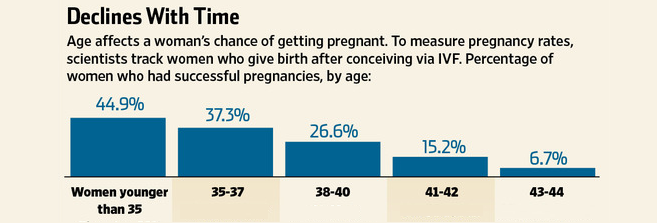
In fact, it is almost unheard of for a woman to get pregnant naturally, using her own eggs, beyond the age of 43-45. For this reason, it is so important that women are aware of their fertility as they continue to age. Age can be a huge issue when it comes to fertility, so if you are over age 35 or so, and you are not getting pregnant as easily as you would like to, it might be a good idea to see a doctor.

Yes, it might sound crazy, but this is a real issue when it comes to trying to conceive. Many couples expect to be pregnant within a month or two of starting to try, however, that is just not always the case.
Getting pregnant can really take some time, when it comes to tracking ovulation days, planning sex accordingly, losing weight if that needs to be done, making healthy lifestyle choices, etc. It can really take quite awhile for all of these things to align and get into the right place to have a baby.

This is why experts suggest waiting quite a bit of time of trying to conceive before seeking professional help from a doctor or a fertility specialist. For women under age 35, the suggested amount of time to try to get pregnant before seeking help is one full year.
Women over age 35, because of potential fertility issues as they get older, are only suggested to wait six months of trying to conceive before seeking help from a fertility doctor or specialist.

Of course, this one is a little bit redundant. We are ALL too stressed out, right?
In this day and age, we are all rushed, overworked, over-scheduled, underpaid and stressed to the max, every single day. However, what most of us don’t realize is that stress can really have a bad effect on fertility. Stress releases the hormone Cortisol, sometimes known as “the stress hormone,” and this can wreak havoc on fertility, throwing hormones out of whack and stopping ovulation all together.
There are so many different things that women can do to try to reduce their stress levels in their day to day life.

First of all, getting enough sleep is a great move, and can really help to alleviate some of a woman’s stress levels. Exercise, as we all know, can really help with stress relief as well, and has been proven to be just as effective as prescription medication when it comes to helping depression and anxiety.
Another great way to reduce stress is cutting negative people and habits out of your life. Surround yourself with people who bring you up instead of down. Make sure you have a good close friend, family member, or counselor to talk to that can help you deal with your stressors, and don’t forget to laugh! After all, laughter is the best medicine!

If you have tried all of the things listed above, and you are still not seeing the results that you think that you should be seeing when it comes to trying to conceive, it might be time to see a doctor. There are many different medical conditions that can contribute to infertility, and women might not even know that they are suffering from these conditions.
For example, PCOS, or PolyCystic Ovarian Syndrome, is a very common fertility disorder that affects up to 1 in 10 women of childbearing age. It can have a very detrimental effect on fertility and can keep women from getting pregnant.

Endometriosis is another common fertility issue that can be keeping women from getting pregnant. Some women might find that they are not ovulating at all, which is what is keeping them from getting pregnant.
Long story short, if you are in doubt, and you think that you might be suffering from a fertility issue that is keeping you from being able to get pregnant, please take the time to see your doctor and get checked out. You will thank yourself, and it is a good way to get some peace of mind when it comes to fertility.

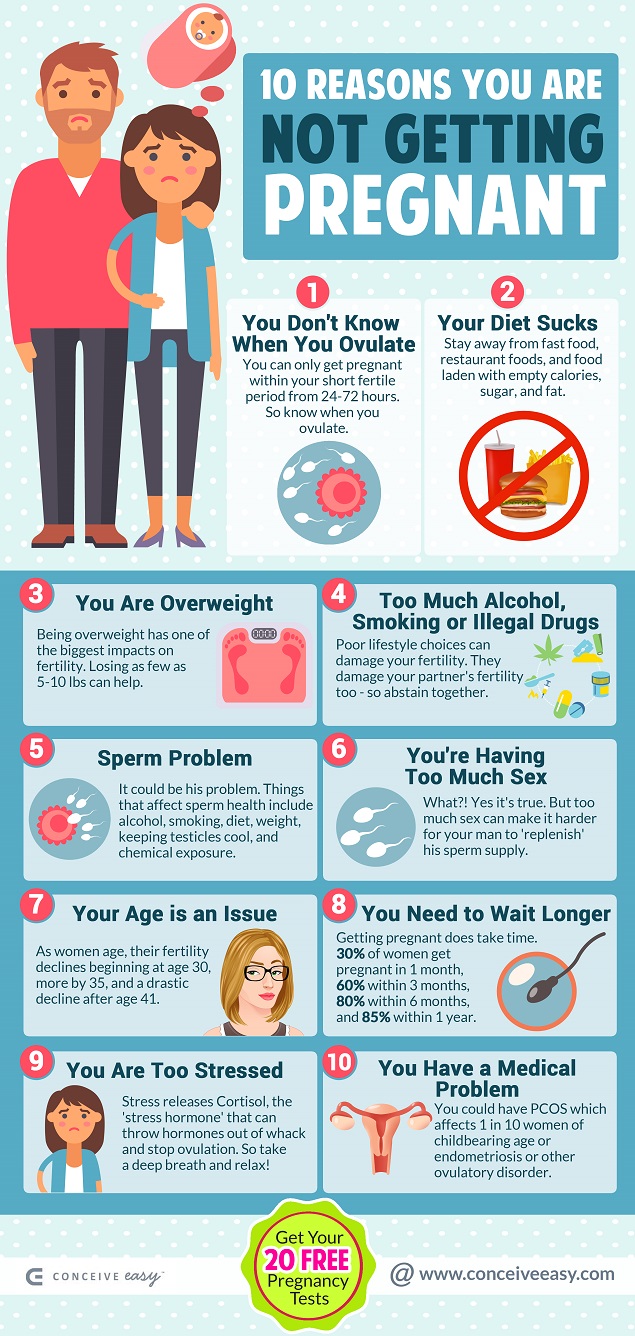
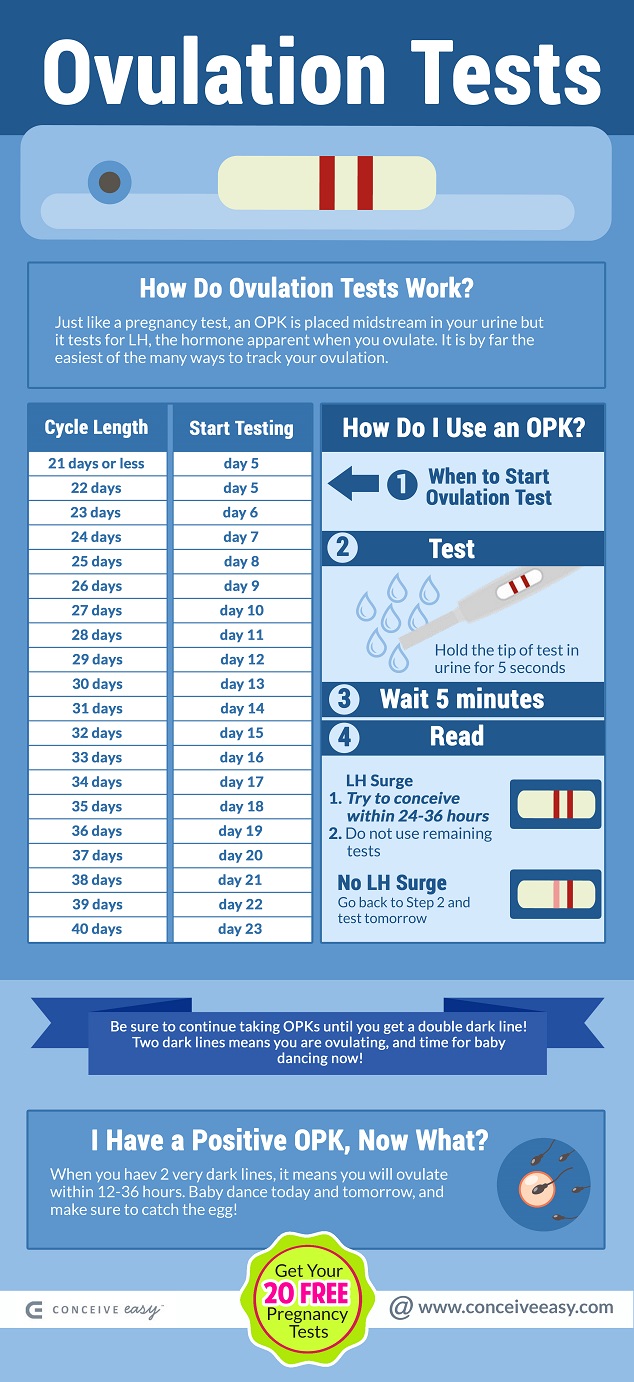









Comments